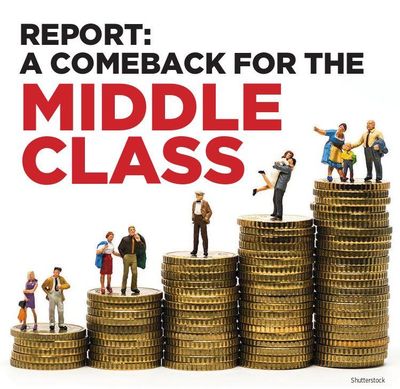Experts say Spokane likely is part of economic boom raising incomes

If your wallet seemed a little fuller last year or your paycheck stretched a little farther, you’re not alone.
The average American household income jumped 5.2 percent between 2014 and 2015, the U.S. Census Bureau said Tuesday. While comparable figures aren’t available for states or cities yet, area economists said they won’t be surprised if a bump occurred in Washington and Spokane.
It could be higher, it could be lower, local economists said. We won’t have the local data for a few weeks.
The national jump in household income was larger than any year on record, prompting President Barack Obama to call it “remarkable progress that American families have made as the recovery continues to strengthen.”
The Census Bureau didn’t release state or local figures. The closest they came is a breakdown for the West region, which includes all the Rocky Mountain and Pacific Coast states, plus Alaska and Hawaii. For that region, household income went up 6.1 percent.
But some of the data that go into that calculation are known for Washington and Spokane County, so economists are fairly confident the average income levels will show improvement.
“What drives (income) is job creation,” said Doug Tweedy, a regional labor economist for the state Department of Employment Security. “We expect increases in 2015 and 2016.”
Wages, which are the biggest portion of income the federal government measures, rose an average of 3.3 percent in Spokane County in 2015 as the labor market improved. Wages in the health care industry, which overtook government as the county’s largest employer, went up an average of 7 percent.
Although there’s a wide range of pay scales in the health care industry – doctors and hospital executives on the high end and home health care workers and nurses aides on the low end – Spokane has seen a growth in the technical side of health care where jobs usually pay better than average, Tweedy said.
Wages for the finance and insurance industry also went up 7 percent and wages for government jobs, which include school employees as well as city, county, state and federal workers, went up 3.2 percent.
“It’s the biggest jump we’ve seen in wages in several years,” said Patrick Jones, the executive director of the Institute for Public Policy and Economic Analysis.
Spokane city and county, as well as Washington state, also had a greater jump in average household income in 2014 than the country as a whole. While the United States saw a 2.7 percent increase that year compared to 2013, the state jumped 5.1 percent, the county 5.6 percent and the city of Spokane almost 11 percent – although it’s probably fair to note that 2013 was a year when average household income dropped nationally and locally, so in a sense 2014 was a year when things were turning around.
Along with wages, the federal income figures include investment income and “transfers” – a term for government payments to individuals that includes everything from Social Security and veterans benefits to Medicare and Medicaid to federal payments to farmers. As the baby boom generation ages, more of them are receiving Social Security, Jones said. Rural counties around Spokane have a greater percentage of people 65 and older than the city or the nation as a whole.
The share of those three income factors is a little bit different for each area. The national household income figures released Tuesday assume the country’s average comes 62.6 percent from wages, 20.3 percent from investments and 17 percent from transfers. For Spokane County, it’s 58 percent from wages, 19 percent from investments and 23 percent from transfers.
It’s also important to remember these are averages, so an individual household’s experience may be different. Overall, wages have gone up for the bottom third of workers and the top third, Tweedy said, but “jobs in the middle are still struggling.”
The national numbers are a sign of a continued slow recovery from the recession that started in 2008. Spokane took longer to recover than most of the country because some of its key economic sectors like construction and manufacturing were hit badly, Jones said. It didn’t have the aerospace and tech industries that pulled the Puget Sound out of the recession faster.
If Spokane numbers are similar, it points to continued slow growth without much danger of dipping back into a recession, Jones said.